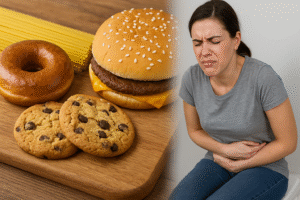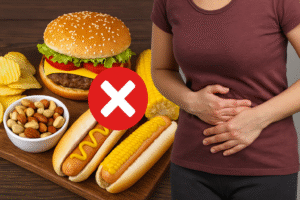Along with a host of other issues, high cholesterol can place you at risk for heart problems. Diet is a powerful management tool when it comes to cholesterol. A person’s diet can raise LDL (bad) cholesterol and triglycerides while lowering HDL (good) cholesterol). This blog aims to identify the dietary cholesterol boosters people most frequently consume, and provide practical substitutes in order to lower the risks of heart disease and improve overall health. Among the most common cholesterol foods to avoid are processed meats and full-fat dairy.
Processed and Fatty Meats
Being mindful of the cholesterol foods to avoid can significantly reduce health risks.
Meat is a great source of protein, however, processed and fatty cuts of meat contain some of the highest cholesterol levels. These are considered bad cholesterol foods to avoid due to their high saturated fat content
These are considered bad cholesterol foods due to their high saturated fat content.
Cholesterol Foods To Avoid:
- Bacon
- Sausages
- Hot dogs
- Salami and pepperoni
- Fatty beef cuts like ribeye or brisket
- Pork ribs
These meats have significant amounts of saturated fats which increase LDL cholesterol and can lead to plaque buildup in arteries.
Healthier Alternatives:
- Chicken and turkey breast fillets
- Lean cuts of beef such as sirloin or round steak
- Beans, lentils, and tofu
Replacing proteins a few times each week with plant or lean options helps support better cholesterol.
Full-Fat Dairy Products
Dairy products provide nourishments, however, saturated fats found in full-fat versions can negatively affect cholesterol and fall into the category of cholesterol foods to avoid.
Foods to Avoid:
- Whole milk
- Heavy cream
- Full-fat cheese
- Sour cream
- Butter
These products can contribute significantly to your daily intake of saturated fat.
Healthier Alternatives:
- Milk and yogurt that is low-fat or fat-free
- Light cream cheese or reduced-fat cheese
- Almond, soy, or oat milk
- Light or fat-free sour cream
Choosing lower fat dairy aids in maintaining proper cholesterol levels while essential nutrients.
Fried and Fast Foods
Fried and fast foods are often considered to be the most unhealthy options because these usually have a mix of saturated and trans fats that put great risk on heart health.
Foods to Avoid:
- Bone-in fried chicken
- French-style fried potatoes
- Fast-food sandwiches with meat patties
- Battered and breaded chicken nuggets
- Onion rings
- Breaded fish
Such products are almost always prepared with oil that is likely to increase LDL cholesterol while decreasing HDL cholesterol.
Healthier Alternatives:
- Healthier baked, grilled, and air-fried options
- Homemade subs or wrap sandwiches
- Whole food-based pre-prepared meals made with fresh ingredients
Home-cooked meals provide the ability to manage cooking fats and eliminate hidden components that raise cholesterol.
Packaged Snacks and Bread Spreads
Commercially prepared baked food and snack items are laden with sugar and excessive amounts of trans fats which negatively impact cholesterol levels. Foods To Avoid:
- Pastry Baked doughnuts
- Cupcakes and layer cakes
- Sweet cookies
- Packaged crackers
- Butter flavored microwave popcorn
Hydrogenated fats can reduce HDL while increasing LDL cholesterol levels which are damaging to the body.
Healthier Alternatives:
- Baked products made from scratch with olive oil or unsweetened applesauce
- Air-popped popcorn sprinkled with herbs or spices
- Fresh fruits and yogurt with no added sugars
Using “zero” and “partially hydrogenated” oils on snack labels is essential in improving quality and selection of snacks.
Meats and Eggs
Egg yolks and organ meats contain high amounts of dietary cholesterol.
For individuals dealing with high LDL levels, these can add up quickly.
Foods to Limit:
- Duck eggs
- Liver
- Kidneys
- Other organ meats
- Egg Yolk
Though high in cholesterol, their nutritionally content (in some cases) makes them dangerous.
Healthier Alternatives:
- Plant proteins or lean meats for everyday meals
- Only use organ meat sparingly
- Remove yolks from eggs or use cholesterol free substitutes
While it’s best to avoid eggs altogether, yolk moderation changes the game.
Sugary Drinks and Sweets
Increased cholesterol levels within your body are directly related to added sugars, which also worsen triglycerides–the fat present in your bloodstream ranking them among the worst cholesterol foods to avoid.
Fast food and refined carbs are widely recognized as some of the worst foods for cholesterol.
Foods to Avoid:
- Store bought pastries
- Candy
- Flavored coffee drinks
- Energy drinks
- Sweetened iced teas
- Soda
Sugar overconsumption is a known catalyst for weight gain and insulin resistance which, like a one two punch, further heightens cholesterol levels.
Healthier Alternatives:
- Fruit
- Low-sugar granola and snack bars
- Herbal teas
- Coffee with unsweetened almond or oat milk
Removing sugary beverages from your diet enhances blood fats for the better.
Refined Carbohydrates
Refined carbs are quickly absorbed and can increase sugar levels in the blood which also increases fat accumulation in the liver. This may also cause an increase in fatty triglycerides and bad cholesterol.
Refined carbs and certain fats are typical examples of foods that increase cholesterol.
Foods To Prevent Include:
• White bread
• White noodles
• White rice
• Baked goods
• Ready-to-eat noodles
Such foods have low levels of fiber and are often added with sugars and fats.
Replacing Items Include:
• Whole grain bread and pasta
• Couscous, brown rice, and barley
• Oats or bran flakes
Fiber facilitates the removal of cholesterol from the body and keeps the intestine active and healthy.
Tropical Oils
Some plant oils are incorrectly branded as ‘healthy,’ yet their levels of saturated fat are alarmingly high.
Oils to Prevent Include:
• Coconut oil
• Palm oil
• Palm kernel oil
These oils are often present in pre-packaged snacks, junk foods, and even in some protein bars.
Replacing Oils Include:
• Olive oil
• Canola oil
• Avocado oil
• Sunflower oil
These oils are characterized by high concentration of unsaturated fats which have a positive influence on cholesterol levels.
Conclusion: Smart Choices for Lower Cholesterol
Consuming foods that raise cholesterol frequently can contribute to long-term heart issues.
Improving cholesterol health levels does not need complete cutting out of loved foods.
It indicates determining what increases your risk and making informed decisions consistently. Refraining from high-cholesterol foods such as processed meats, full-fat dairy, fried foods, and sugary snacks can protect the heart and bowels well into the future.
Items like fried meats and sugary pastries are often ranked in the top ten worst foods for high cholesterol.
Was this helpful? Pass it on to someone or comment with your most-loved cholesterol-friendly food alternatives. Your heart will appreciate it.








